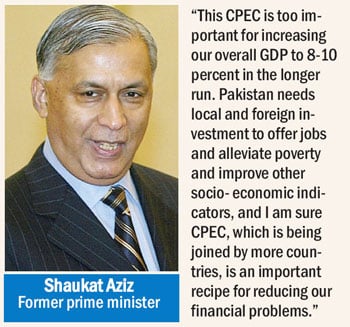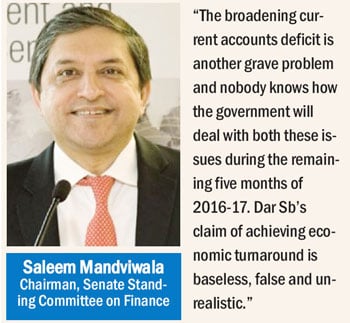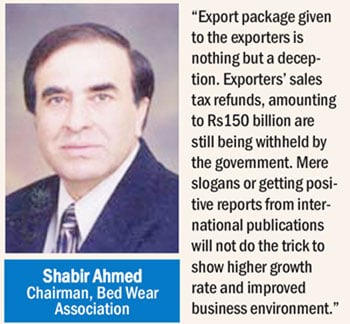INSIGHT
The first six months of 2016-17 have witnessed an unwarranted 55 percent fiscal deficit and 90 percent current account deficit leaving behind a big question mark about the much proclaimed economic stabilisation in the country.
 These twin deficits at Rs400 billion and $3.6 billion respectively had presumably been allowed to immensely increase after the completion of three years $6.2 billion Extended Fund Facility (EFF) bailout International Monitory Fund (IMF) package that ended in September last year.
These twin deficits at Rs400 billion and $3.6 billion respectively had presumably been allowed to immensely increase after the completion of three years $6.2 billion Extended Fund Facility (EFF) bailout International Monitory Fund (IMF) package that ended in September last year.
The country’s fiscal deficit – a mother of all economic ills - has hit a four year high of 2.4 percent of the gross domestic product (GDP) that is inviting criticism of all shades. All this happened because there was no oversight of the IMF, which led to financial indiscipline.
Similarly, the widening of the current account deficit is also being criticised because of not helping to enhance exports and curtailing unnecessary imports.
Three former finance ministers view as “very serious” the increasing fiscal and current account deficits. They urged the government to narrow down gaps between income and expenditure and imports and exports to achieve the much needed economic stability without which there can be no concept of real development and progress.
Former prime minister Shaukat Aziz, who earlier served as the finance minister under ex-president general Pervez Musharraf’s government, expressed his concern over the widening of twin deficits and said that both the issues could cause more problems to the country’s struggling economy in the days to come.
“The buzz word is a reform agenda which especially is more important in the context of falling revenues,” he said, and added tax collection needed to be significantly improved by focusing more on direct taxes and by further curtailing the discretion of the Federal Board of Revenue (FBR) officials.
He said he still believed that more automation would remove the remaining inter-action between the tax payers and the tax officials aimed at building the confidence of the private sector. “And then we have to minimise the number of taxes and curtail the tax rate by adopting a holistic approach to greatly improve revenue collection.”
The former prime minister, however, was much pleased over China-Pakistan Corridor Project (CPEC) and said it will go a long way to develop infrastructure, including ports, roads and transport projects. “This CPEC is too important for increasing our overall Gross Domestic Product (GDP) to 8-10 percent in the longer run,” Aziz said.
“Pakistan needs local and foreign investment to offer jobs and alleviate poverty and improve other socio- economic indicators, and I am sure CPEC, which is being joined by more countries, is an important recipe for reducing our financial problems,” he added.

 Another former finance minister and a renowned economist Dr Hafeez Pasha was also very critical of the falling revenues experienced during July-December last. According to him, budget deficit and current accounts numbers were disturbing. “Revenue growth has turned 0-1 percent negative while combined non- tax revenue of the federal and provincial government have actually declined by 32 percent and this is not at all good for our economy,” Dr Pasha said.
Another former finance minister and a renowned economist Dr Hafeez Pasha was also very critical of the falling revenues experienced during July-December last. According to him, budget deficit and current accounts numbers were disturbing. “Revenue growth has turned 0-1 percent negative while combined non- tax revenue of the federal and provincial government have actually declined by 32 percent and this is not at all good for our economy,” Dr Pasha said.
The Public Sector Development Programme (PSDP), he pointed out, restricted to 25 percent out of the total of Rs900 billion kept for the centre and the provinces, while only Rs200 billion were spent on high priority infrastructure projects of CPEC during the first six months of the current financial year.
“I am afraid we are moving in the inflationary area as the government has already borrowed Rs1 trillion and things have started slipping from the government’s hands at the end of the IMF programme in September last,” the former finance minister of the first Pakistan Muslim League-Nawaz (PML-N) government said.
Overall, he regretted, economic numbers were painting a very depressing picture but “I am very concerned over negative growth in revenue”, he said fearing that fiscal deficit would further increase in 2018 as being the last year like that of 2012-13 when Pakistan Peoples’ Party (PPP) met the same fate.
“No way can we achieve any real economic stabilisation without adhering to reforms programme, particularly in the revenue and energy sectors,” Pasha warned. On the external front, he said, the real crunch would start coming when in next two years period, the government would have to make $15 billion repayments.
Chairman of the Senate Standing Committee on Finance and former state minister for finance in the previous PPP government, Saleem Mandviwala said that low revenues were fast becoming a serious issue which amply suggested that the government would be failing in meeting its revenue collection target by June 30 this year.

 The broadening current accounts deficit, he said, was another grave problem and nobody knew how the government would deal with both these issues during the remaining five months of 2016-17. He angrily asked why should the government seek massive amounts of loans, and was failing to enhance exports.
The broadening current accounts deficit, he said, was another grave problem and nobody knew how the government would deal with both these issues during the remaining five months of 2016-17. He angrily asked why should the government seek massive amounts of loans, and was failing to enhance exports.
“Dar Sb’s claim of achieving economic turnaround is baseless, false and unrealistic,” he said accusing the officials of the ministry of finance of manipulating economic numbers only to mislead the nation. External debt, he said, has exceeded $74 billion and total debt and liabilities were increasing on a rapid scale, making a mockery of the government’s claim of any economic stabilisation or achieving any improved GDP growth rate.
Chairman of Bed Wear Association Shabir Ahmed said the business community, including the exporters were sick and tired of the government’s false claims of turning around the struggling economy. “Export package given to the exporters is nothing but a deception,” he said, and added that overall economic conditions were worsening with the passage of every day as the government was busy only in fire- fighting a political battle due to the prime minister’s family involvement in the infamous Panama gate.
He feared further rise of dollar against rupee due to what he termed “flawed exchange rate policy” being pursued by the ministry of finance and the central bank. “Exporters’ sales tax refunds, amounting to Rs150 billion are still being withheld by the government,” he said, and urged the finance minister to release the funds to enable the exporters in increasing their exports.
Ahmed said the government must listen to the demands of the business community to increase local investment and also foreign direct investment (FDI). “Mere slogans or getting positive reports from international publications will not do the trick to show higher growth rate and improved business environment,” he said.
The vital question now was, would the government eventually contain its fiscal deficit target at 3.8 percent of GDP, which has already surged to 2.4 percent in the first six months and in absolute terms has crossed Rs800 billion that is 55 percent higher than Rs515 billion a year ago.
The government had been projecting 23 percent growth in revenue which unfortunately went negative during July-December. The government blames provinces for wasteful expenditure who don’t accept it. They privately accuse the centre of lavish spending which widened the gap between the income and expenditure.
One of the major issues was Rs58 billion which could not be accounted for under any head, but the officials of the ministry of finance reported it as “statistical discrepancy” during the first six months, which was surprisingly Rs8.8 billion negative during the corresponding period last year. Independent economists maintain that the government showed Rs212 billion statistical error to cut budget deficit.
July-December budget deficit rose to 63 percent of the annual target of Rs1.276 trillion or 3.8 percent of GDP against a parliamentary requirement of 1.8 percent of GDP (Rs600 billion). This led to Rs200 billion budget deficit despite the fact the government did not make power subsidies.
The government borrowed Rs240 billion from external sources and Rs558 billion from domestic sources to bridge the yawning budget deficit gap. In absolute terms, the total revenues were below Rs2 trillion. There had been a decline in non- tax revenue due to reduction of profit of the State Bank of Pakistan (SBP), one of the reasons that culminated on low revenue income. The SBP booked Rs87.6 billion profit during July-December which was significantly low compared to the same period of last year.
It is in that backdrop that annual revenue target is expected to be missed with a bigger margin and new proposals are being sought by the finance minister to offset the current year’s reduced revenues for the next financial year.
Part of the problem is that the government could not get sufficient revenue through the levy of tax on real estate business. The government encountered the financial problem when it introduced 0.6 percent withholding tax, which could not be adequately collected. Cash transactions by medium and small traders contributed to low revenue and in the process commercial banks also lost their good income.
The government decided to regulate the real estate market by introducing an appropriate legislation, but that backfired. The government went for another legislation to undo the practice of holding properties and bank accounts under ‘benami’ (fake) accounts. Will that measure pay-off? So far, it seems to be another gamble with a view to bring the informal or black economy into the formal economy. Informal economy has grown much larger than the formal economy, depriving the national kitty of a very good amount of taxes.
There is a consensus among the independent economists that Pakistan needs to inject money in the struggling economy to create more space for development and this objective should be achieved without much emphasis on fiscal stabilisation that calls for narrow focus on budget deficit.
These economists had been maintaining that IMF-inspired reform programme was self-serving and forced the Dar-led economic team to continue to show inflated economic numbers aimed at achieving fiscal deficit target. During the three-year EFF period, reform agenda was shown broadly on track.
Since there is no IMF pressure any more, where is the sustainability of the programme? What is the outcome of the IMF programme and what happened to the economic fundamentals? All this speak volumes about the current state of the economy, particularly the lifeline – FBR’s revenues that are unsatisfactory to help plan new revenue collection target for the financial year 2017-18.
The writer is a senior journalist based in Islamabad